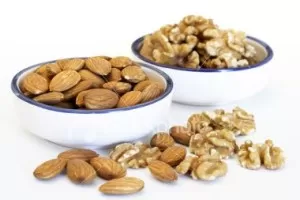There are many natural alternatives you can try before aspirin and other anti-inflammatory medication. These foods will also simultaneously advance your health with powerful nutrients which will set the stage to help prevent future pain and illness…and they taste incredible!
Chronic pain can really deter you from doing even your routine activities. Anyone who suffers from any kind of chronic pain can surely tell you how difficult it is sometimes to get up from bed in the morning because of back, knee or neck pain.

Pain is a huge de-motivator and chronic pain has been linked to increased depression and and other serious health conditions. Inflammation also cause many adverse effects causing soft tissue and joint swelling. Pain can be controlled in the long-term by dietary changes. Using prescribed pharmaceuticals or even over the counter pain pills will always result in some type of recurrence since they only address symptoms and not causes. The key is a diet filled with foods that bombard your body with the right nutrients to sustain health and prevent pain. Here is a list of 21 anti-inflammatory foods.
1) Ginger
Ginger is one of naturesbest ways to reduce pain. Ginger reduces pain-causing prostaglandin levels in the body. A study by researchers found that when people who were suffering from muscular pain were given ginger, they all experienced improvement. The recommended dosage of ginger is between 500 and 1,000 milligrams per day. Drink Ginger Tea or place shavings in your foods. Either way will get you relief from recurring pain.
2) Acai Juice
A daily glass of Acai Juice is associated with reduced pain in joints, and this is correlated with improved blood antioxidant levels. This powerhouse, antioxidant packed berry from the Amazon is helping people feel better and increase energy levels all while detoxifying the body.
3) Coffee

Studies show that 200 milligrams of caffeine-about the amount in 16 ounces of coffee-provides relief from headaches, including migraines to some extent by constricting blood vessels. But keep in mind that relying on caffeine long-term can backfire, since habitual coffee drinkers usually suffer withdrawal headaches when they cut back on the caffeine. Consume coffee moderately to advance your health.
4) Olive Oil
Olive oil is like liquid gold when it comes to fighting pain. It is rich in antioxidant polyphenols that help to reduce common pain causing mechanism in the body. Olive oil is also a good substitute for butter, but use it carefully as it has 120 calories per tablespoon. Olive oil is best used cold and should not used for high temperature cooking since this can actually convert it to a trans fat which promotes inflammation.
5) Sage
When your throat is scratchy and irritated, try sipping on a tea made from brewed sage leaves. It’s a remedy recommended by herbalists and has some support from clinical trials. A 2006 study found that spraying sore throats with a sage solution gave effective pain relief compared to a placebo.
6) Raw Almonds and

Raw almonds are a great source of Omega-3 fatty acids and anti oxidants, both of which help reduce pain. Add those nuts to your salad or just much on a handful as an afternoon snack. Raw walnuts and walnut oil also contain the same powerful Omega-3 fatty acids that fight pain and inflammation in the body. Walnuts are top of the tree when it comes to heart healthy super foods.
8) Greens
Greens like spinach, amaranth, fenufreek leaves, argula not only have high iron content, but are loaded with Vitamin K that helps maintain strong bones and healthy joints. A study shows that older adults with ample blood levels of K were less likely to develop osteoarthritis, compared to a low-in-K control group. However, Vitamin K also helps with blood clotting, so if you’re taking blood thinners, be sure to check with your doctor before boosting your K intake.
9) Grapes
Resveratrol in grapes, and grape juice can often have an analgesic effect similar to aspirin.
10) Flax Seeds and Flax Oil
Freshly-ground flax seeds and cold-pressed flax oil, contain plentiful amounts of fatty acids known as Omega-3s. DAs with olive oil, do not cook with flax oil. Coconut and grapeseed oil are better oils to cook with since they maintain their healthy properties under heat.
11) Turmeric
Turmeric (curcuma longa) is the yellow spice commonly used in Indian curries. Research shows that curcumin suppresses pain through a similar mechanism as drugs like COX-1 and COX-2 inhibitors (without the harmful side effects). Choose a standardized extract with 1500mg of curcumin content per day.
12) Salmon
13) Mackerel and
14) Herring

Most fatty fish like salmon, mackerel and herring also contain valuable oils. Omega-3s convert in the body into hormone-like substances that reduce pain and inflammation. According to Dr. Alfred D. Steinberg, at the National Institute of Health, fish oil is indeed n anti-inflammatory agent. Fish oil acts directly on the immune system by suppressing 40 to 55 percent of the release of cytokines, compounds known to irritate joints. Many other studies also demonstrate that eating moderate amounts of fish or taking fish oil reduces pain and inflammation, particularly for arthritis sufferers. Be sure to select only high quality fish oil since consuming rancid oil will do more harm than good.
15) Celery and Celery Seeds
James Duke, Ph.D., author of The Green Pharmacy, found more than 20 anti-inflammatory compounds in celery and celery seeds, including a substance called apigenin, which is powerful in its anti-inflammatory action. Add celery seeds to stews or use as a salt substitute in recipes.
16) Sour Cherries
Sore muscles after a workout don’t have to be a given. British researchers recently found that people who drank 1 ounce of concentrated cherry juice twice daily for 10 days bounced back faster from their workout (intensive leg-resistance training sessions) than those who skipped the juice. Researchers think it’s because the anti-inflammatory and antioxidant properties in tart cherries-and other dark red and purple fruit juices like grape, pomegranate, acai, blueberry and cranberry-act as natural NSAIDs (nonsteroidal anti-inflammatory drugs, such as ibuprofen and aspirin), reducing exercise-induced muscle damage. Only two tablespoons of concentrated juice need to be taken daily for effective results. Sweet cherries have also been found to be effective.anti-inflammatory-fruits
17) Blackberries
18) Raspberries
19) Blueberries and
20) Strawberries
Similar anti-pain compounds have been found in berries like blackberries, raspberries, blueberries and strawberries. They are excellent anti-inflammatory foods. They are full of vitamin C, an antioxidant with powerful pain-reducing properties, according to research.
21) Cayenne Pepper
Ironically, cayenne pepper turns DOWN the heat on inflammation due to its powerful anti-inflammatory compound capsaicin.
For additional help with reducing your pain please call us at 719-568-9790 to speak with a Licensed Physical Therapist. We are the leaders in Physical Therapy and pain relief in our area.
